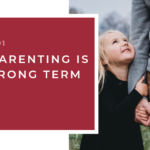Though I write today, I have few words. Instead, I have a lot of emotions.
Like so many of you across the country, I feel deeply saddened about the school shooting in Parkland, FL. I’m angry. I’m disappointed. Unsettled. Disheartened. And as a dad, I’m concerned and guarded.
What used to be a faint thought in the back of our minds of a similar act hitting our own neighborhoods is, unfortunately, becoming a more deeply rooted and constant concern.
As a parent, these unceasing reminders can instill a lot of fear. Our kids need to learn how to process the same emotions we all feel today. Scared. Panicky. Sad. Deflated. Only in naïveté can we shelter our kids from ever experiencing a world free of such evil.
Parents, your emotions matter. So do your child’s. Labeling, or putting words to what we feel, is critical for feeling safe again—especially after a crisis.
On the other hand, our emotions cannot control our actions or how we choose to live our lives. Evil loves fear. But if we cower, our kids will, too.
My prayer and hope, as a dad myself, is that we find within ourselves the courage to stand against evil and face our fears with the one weapon evil abhors—love.
What that looks like differs depending on the age of our children. Here’s a brief overview of what’s important to remember as we talk with our kids about school shootings.
- Process Your Own Emotions
In times of crisis, our kids’ greatest need is to feel safe.
As neuroscience researcher Daniel Siegel writes, “We need to be open to our child, feeling that safety in ourselves and creating the sense of ‘love without fear’ in our child.”
In other words, don’t expect your kids to calm down while you frantically tell them everything will be okay. Our kids feel the discrepancy, and it communicates to them that it’s not okay to talk about or process feelings.
In my book Safe House, I write that being aware of what we’re feeling as parents, and why we’re feeling that way, is crucial to how safe our children feel. If we’re unaware, it’ll spill into how we act around, and interact with, our kids.
Frankly put, our kids become who we are. They follow our lead.
A few ways we, as parents, can calm our own fears and feel safe again:
- Lean on and strengthen your support systems (i.e. family, friends, church community, etc.). New research and the first of its kind, shows that feeling supported by a faith community led to fewer symptoms of depression and posttraumatic stress disorder.
- Talk with trusted friends who have faced similar experiences. If we don’t process our own emotions with God and other adults, we may inadvertently end up using the relationship with our kids to process, and this is not helpful to them.
- Be honest with your kids and show appropriate emotions, but don’t lean on them for your support.
- Filter Exposure To The Event
In regard to exposure, secondary trauma happens when we experience events secondhand, either repeatedly through a screen or from someone who was directly traumatized.
A few key thoughts about limiting exposure:
- Try to limit what you, and especially your kids and teenagers, see in the news. In the world of social media, we can now watch events literally through the lens of people experiencing them as they unfold. Especially with older kids and teens, don’t merely avoid the videos, talk to your kids about why it’s not helpful to watch them.
- Don’t get caught up in the ratings driven “breaking news cycle;” and for the love of all that is good in the world, don’t write stupid stuff on Twitter.
No matter the event, check your biases, learn the facts, and courageously help where you can.
- Maintain Everyday Routines
School shootings bring a lot of fear and trepidation to parents and kids about going back to school. Kids need to keep their routines as normal as possible to feel safe.
- One of the most practical ways of doing this is to strengthen or develop new rituals of connection between you and your kids. While you can’t be with them every minute, you can ensure that at home they feel safe and emotionally connected. Depending on the age of your kids, rituals might include bath time, reading together before bed, or playing games.
- One of the most significant ways to help your kids internalize and carry the safe emotional connection they have with you to school is to spend a minimum of 20 minutes of command-free time each day playing with your kids.
- You can also use transitional, or comforting, objects—like a picture of you, a teddy bear, etc.—that your kids can take with them to school that symbolize safety.
Take extra time this week to slow down, clear some things off your schedule, and be together.
Not unlike conversations about sex, parents tend to feel a lot of pressure about saying the right thing. Don’t underestimate the power of your emotional presence to calm and soothe your kids.
If you as a parent need reassurance, learn about how your local police department and school administration work together to provide a secure school environment. You can also get involved and be an advocate for increasing security at your local schools.
- Talk To Your Kids Age-Appropriately
No matter the age of your child or teenager, seek to understand their inner world before trying to get them to understand our outer world.
First, listen to feelings and concerns.
Second, seek understanding and clarification.
Third, think about the story you want to tell.
No matter the age of your child, read through each age demographic below, because they build on one another.
- Pre K- Age 6: Younger kids are unlikely to understand the complexities of what’s going on with mass shootings. Unless you, or a family you know, were directly impacted by the event, the American Academy of Pediatrics suggests not bringing it up with younger children.
However, if your kids do learn about it or ask questions, especially those in the age 6-8 range, keep the story simple and factual. Don’t lecture. Keep your story to no more than 2-3 sentences and allow your last sentence to tell the heroes or good coming from the story.
For a litmus test: Think about your child laying in bed alone tonight. What story will he/she be repeating in his/her head based on what you say?
If they do begin to worry, there’s no better time than now to help them verbally label emotions like fear, anger, disappointment, and anxiety. Allow them to ask questions. This age is critical for neural integration—making sense of our feelings through language processing.
- Age 7-11: This is not much different from Pre-K to age 6. Shield your child from graphic images and commentary. Keep the news cycle to a minimum and out of earshot of your kids. Safely allow them to talk about emotions, thoughts, or questions they have. Keep your normal routines as a family. If your kids do see images, try to show them pictures of the heroes as well. Remember, the opposite of fear is love (1 John 4:18).
- Age 11-14: Again, see pre-K through age 6 above. Since middle schoolers are likely more aware of the details related to yesterday’s events, how we process with them is similar. Be assertive and ask them what they heard about it. Listen to how they are processing it. Allow them to ask questions and answer them to the best of your knowledge.
Use this as an opportunity to establish and talk to them about your family values. Allow your kids to provide input. Talk to them about how your family, based on values, responds in such situations (i.e. prayer, sending letters, volunteering locally, etc.). This is a very helpful way to separate emotion from action and teach your growing middle schoolers about empathy.
- Age 15-18: Chances are teenagers don’t just want to talk about what happened, they want to do something about it. I love this about today’s teenagers. Instead of getting into political debates about a given situation, listen to how your teenager is processing the shooting. Again, listen, understand, and help them put words to what they feel.
Then, guide the conversation on how they can take a more active role in being a leader in their community and a voice for love locally.
- Model Compassion To Others
The Latin root of the word compassion means to “suffer with.” I embrace the emotions I feel today and pen these words to help other families, because if I don’t “suffer with” victims now, when will I?
If I want my children to value human life, they need to see me—their dad—practice what I preach.
As parents, let’s find support, label how we feel, and move forward in love (1 John 4:18).
To the victims and the families in Parkland, FL, our thoughts, prayers, and compassion are with you.
Joshua Straub, Ph.D. is a trained trainer for the International Critical Incident Stress Foundation in Responding to School Crises and author of Safe House: How Emotional Safety is the Key to Raising Kids Who Live, Love, and Lead Well. His most cherished roles are husband and dad.
Laura Captari, M.A. contributed insights for this article. She is a doctoral student at the University of North Texas, where she specializes in working with children and families. Her research explores pathways to resilience and posttraumatic growth following adversity, including the roles of relationships and faith.







I loved it !! VERY INTERESTING!!! Tell me about you ?
Sincerely,
Barbara L. Parrish
Josh, thank you so much for sharing this with us, my son goes to Marjory Stoneman Douglas High School where the shooting took place and at the moment he is so overwhelmed he is so afraid to express his emotions and has not been empathetic about the whole ordeal, especially after losing friends and his athletic coach to this horrific shooting. I just dropped him and his sister of to Youth group which he did not want to attend, overall he has a difficult time handling grief, depression and sadness. Please pray for us in this community as our hearts are broken and hurting, I know we can look to the Rock and the joy of our salvation, because we know He is our help and fortress.
Oh Dawn, I am so sorry.
I cannot imagine the pain your son is going through. If you have any questions along this crisis journey feel free to email me. Hold one another and stay close to those kiddos. You have our prayers. I have been lamenting alongside you all day.
Josh
Dawn, my heart aches reading your response! Prayers to you and your family, specifically for your son and the overwhelming grief he’s tackling!
Dawn-
Please know there are people everywhere praying for all of you that are so closely affected by this tragedy.
Thanks so much Josh. Your words are always so powerful and inspiring.
Great job! Blessings.